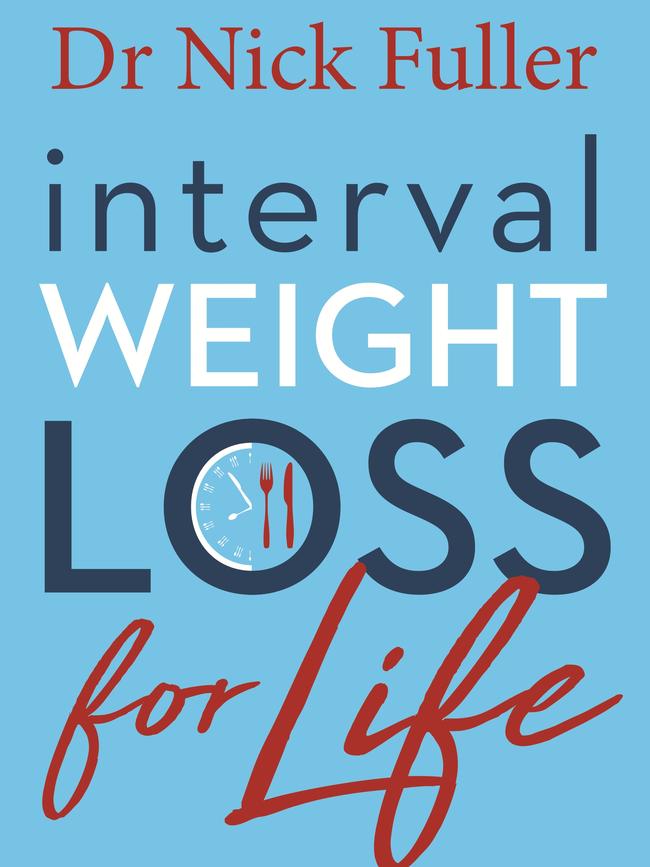Dr Nick Fuller: Why you need to gain weight to lose it
THE secret to long-term weight loss may mean throwing out what you think you know about ‘dieting’, obesity expert Dr Nick Fuller says. He shares his tips to shedding weight — and keeping it off.
Body+Soul Daily
Don't miss out on the headlines from Body+Soul Daily. Followed categories will be added to My News.
YOUR body has a ‘set point’ when it comes to weight.
This is the weight that your body considers normal, and it will strive to return to it when you diet.
That’s why dieting is so stressful on the body — it can slow your metabolism and the way your appetite hormones work as your body repeatedly fights its way back to its set point.
A slower metabolism means you burn less energy at rest, which in turn means your body has to work harder to burn food.

Coupled with this are appetite hormones that don’t switch off regardless of how much weight has been regained — your brain keeps being told to eat more.
GET THE RIGHT START
Because of these issues, it’s important to have what I call a ‘wash-out’ period to return to your set point before embarking on a sustainable weight-loss plan.
If you’ve recently finished a diet and weigh less than your set point, you will need to gain weight by eating nourishing food and remain at this set point for about a month before beginning my Interval Weight Loss program.
MORE FROM DR NICK FULLER
THE BIG, FAT PROBLEM KYLE SANDILANDS CAN’T ESCAPE
WHICH MILK IS THE HEALTHIEST FOR YOU
I’m not going to sugar-coat it — it could take months, depending on how much weight you lost and how drastic a measure you took to lose it.
But the good news is you will be allowing your body to recover from the stress imposed on it.
EAT MORE CARBS, OK!
All too often clients tell me they are avoiding particular foods and putting aspects of what they refer to as a ‘low carb’ diet into place when I first see them.
They fear pasta and grains, believing they cause weight gain. Many of them are also under the impression that some fruits are ‘fattening’, as they have been told or read that they are high in sugar.
Of course, all of this is untrue but it takes time for people to trust and understand how the body reacts to certain foods.

Carbs are a common scapegoat for our weight problems, but what you’re really experiencing when you first increase your carb intake during your wash-out period is an increase in water content in the body.
Carbs are made up of many sugar units that can be bundled together and stored as glycogen in the body. And each gram of glycogen binds to 3g of water.
So the number on the scales might have gone up after adding more carbs to your meals, but it’s not a concern. People see this change on the scales, though, and panic as they assume it must be true weight gain.
In actual fact, carbs — from fruit, vegetables and wholegrain sources are going to help you lose the weight in the long-run, along with helping to prevent certain types of cancer, type 2 diabetes and heart disease.
So don’t be disheartened when you see the number on the scales go up with the reintroduction of healthy carbohydrates.
It’s just water.
YOUR SET POINT
Can you remember a weight you were at for a long period — say, for one year — in the past five years? This is likely to be a weight you’ve always hovered around. This is your set point. Once you’ve reached that weight and it’s stable, you’re at your set point. For some, your current weight may be your set point, even if that’s the heaviest you’ve been.
If you haven’t weighed yourself very often in recent years, weigh yourself now.
If your clothes have been fitting the same for at least a year, you are most likely at your set point. If not, do a wash-out period while weighing yourself weekly until your weight has stabilised for about a month.

There are exceptions to my wash-out rule. If you are currently at your set point and don’t have an extensive history of dieting, then you will see success on my plan from the get-go without having to put on any weight first. However, I cannot stress this enough — you must ensure your weight has stabilised before starting my plan. This sets the foundation for long-term weight loss as your body will be able to create new lower set points as you move through the program.
You may need to shift your mindset from the idea of a quick fix to succeed in this approach. It may seem like a drawn-out process, but it will ensure you never have to go on an extreme diet again. And that’s definitely worth the wait.
INTERVAL WEIGHT LOSS PROGRAM
You’re finally at your set point, now what? Nick Fuller shares his tips to shedding weight — and keeping it off.
LOSE WEIGHT ONE MONTH, MAINTAIN IT ONE MONTH
“Imposing a break from weight loss stops your body thinking you’re on a diet and slowing down its metabolism,” Fuller says.
It will accept its new set point after a maintenance month.
“It’s important you only lose around 2kg in your weight-loss month — any more will trigger your body to fight its way back to normal.”
CARBS AND PROTEIN WITH EVERY MEAL
“Both are essential for a properly functioning body, and both help you feel fuller for longer, aiding long-term weight loss,” Fuller says.


BIG BREKKIE, SMALL DINNER
“Your meals should get smaller in size as the day progresses.”
This rule applies to both weight-loss and maintenance months.
NO FOOD IS OFF LIMITS, BUT SOME ARE LIMITED
“You only end up craving the food you’ve omitted. This is a long-term program, not a diet, so it has to be inclusive of all foods,” Fuller says.
You can have one treat food and one meal out a week during weight-loss months, and double that during maintenance months.
EXERCISE MOST DAYS
“For weight loss, do 30 minutes of varied exercise six days a week,” Fuller says.
Reduce the intensity and remove one day of exercise during maintenance months.
WEIGH YOURSELF WEEKLY
“This is … essential for ensuring you don’t lose too much weight, too quickly,” Fuller says.
Try weigh yourself on the same day and time each week for accuracy.
